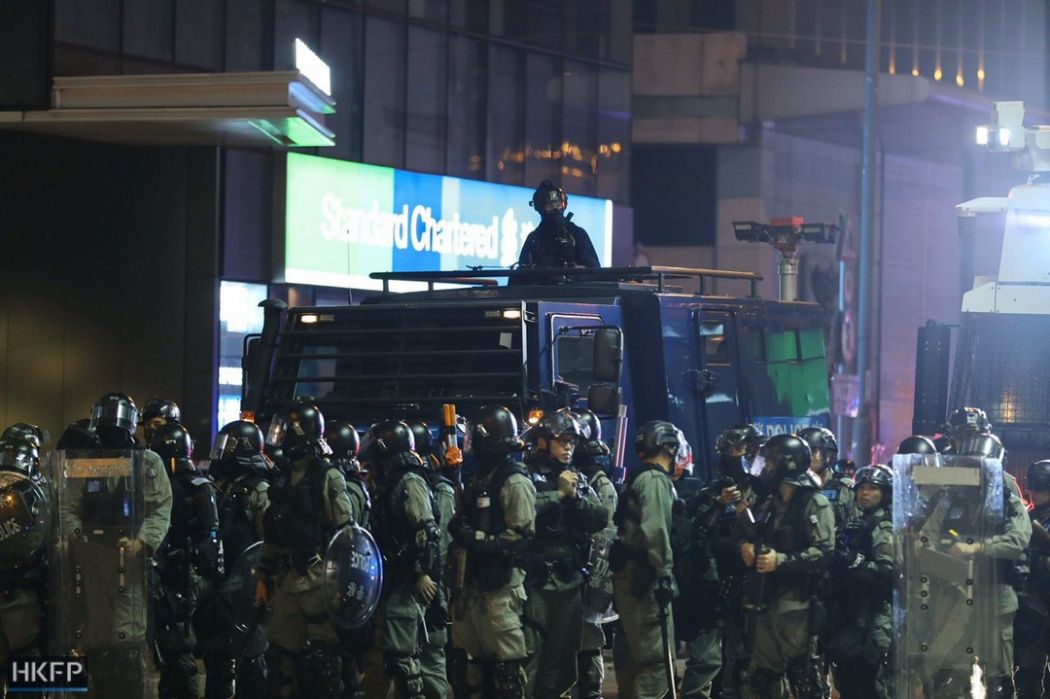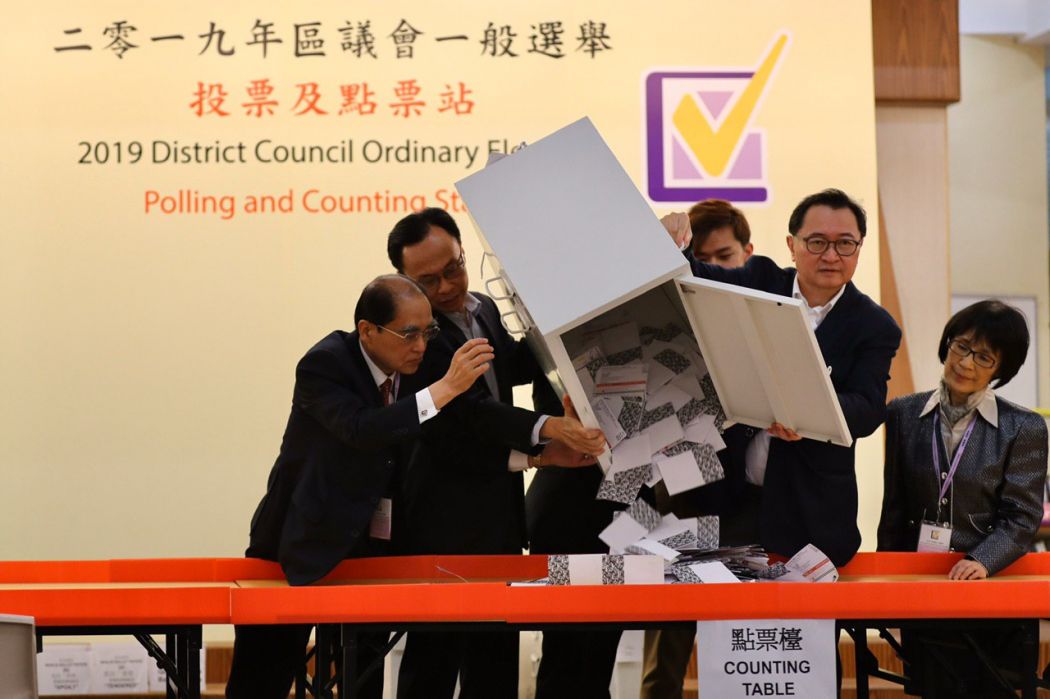By Caitlin E. Schultz
The news in mid-December shook the Hong Kong resistance movement: four leaders of Spark Alliance were arrested for money laundering. The organisation helps victims of political arrest and has been trusted with millions of dollars in donations to support the thousands affected since demonstrations began last June.
In addition to the arrests, HSBC froze the organisation’s bank account, and law enforcement confiscated assets on-site. The authorities have failed to explain the basis for the charges, and HSBC has changed its story on shutting the account. The implications of this news are felt beyond Spark Alliance and its donors.

During the ongoing resistance movement – originally against an ill-fated extradition bill – citizens have found a multitude of channels for pushback, exhibited through a model of organising without organisations, made possible by several catalysts including the leaderless nature of the movement, the internet and technology, a sense of emergency, and a high level of trust among the public.
Still, there is a need for legally-registered organisations, whether new ones created in 2019, or those established years before. When Spark Alliance was targeted in December—whatever the reasons—the population was stunned. It was perceived as a direct political attack on the entire resistance movement, meant to eliminate its funding base and kill it off.
Is nothing safe anymore? Donations to Spark Alliance, a registered organization under company law, may have been seen as less risky than ad hoc donations to anonymous organisers. They may also be perceived as safer from criminalisation than other forms of dissent, such as marching or singing in shopping malls.

But now that framework has been turned on its head; the authorities continue to seek any way to track down and arrest those working against them. Targeting a registered organization may give the authorities access to a treasure trove of information about who donated, when, and in what amounts.
Last weekend’s open letter from the Junior Police Officers’ Association stating that the authorities believe there is a basis to arrest anyone supporting the movement is a startling admission of what Hong Kongers feared all along.
What does this mean for the criminalisation of dissent for organisations situated similarly to Spark Alliance, and what does this mean for civil society trying to operate and fundraise legally in Hong Kong?
From ‘protest’ to ‘dissent’ – it’s all political
The authorities have branded the resistance as criminal activity, using national security and counter-terrorism justifications to crack down on dissent. Street clashes with police are an understandably disproportionate focus of international observers of the mass resistance in Hong Kong.
The entire resistance movement has worked together for several months to ensure that police do not run unchecked in the streets, and the toll on the over 6,500 arrested cannot be minimised. But with many frontliners off the streets, the movement is adapting away from street conflict.
In fact, many of those arrested are not frontline protesters, and the police have begun targeting citizens nearly at random. Focusing on this one aspect of the broader movement and referring to the past six months as “protests,” neglects the ongoing criminalisation of other forms of dissent.

Some resistance roles are more visible than others, and some are more directly related to street clashes. But anyone living in Hong Kong knows that no one is truly safe from arrest and police brutality.
Signs of resistance can be subtle and innocent: using coins and single-journey tickets for transit, carrying a face mask or an umbrella, dining at a “yellow” restaurant that supports the movement.
More obviously political actions that have been criminalized are posting on Lennon Walls, singing in shopping malls, and calling police names. The police also act arbitrarily, victimising those without connection to the resistance.
As rule of law deteriorates and the Hong Kong authorities target all levels of participation and criminalise as many actions as possible, the landscape for civil society organisations is also rapidly shrinking.
The use of the law in this manner violates international standards on freedom of speech, opinion, association, and assembly, international human rights guarantees which are arguably not well-protected in Hong Kong in the first place.

One old trick with some new tactics is that the lack of a comprehensive NGO law has readily allowed for selective enforcement and political targeting of organisations essential to protecting the rights of Hong Kongers.
Nonprofit law and ‘political’ organizations in Hong Kong
Many internationally-guaranteed human rights are implicated by nonprofit laws, primarily the freedom of association. Closely related are the freedoms of speech, opinion, and expression, which governments cannot abridge without a necessary and legitimate interest at stake.
Privacy and anonymity are two other rights that should be protected by nonprofit laws. Finally, states and state actors have special obligations where these rights are exercised for political protest, and where special classes of people such as children, the elderly, minority groups, and those with disabilities are involved.
In Hong Kong—which is bound by the provisions of the International Covenant on Civil and Political Rights, among other international human rights laws and norms—there is no nonprofit law. In many other countries, a comprehensive piece of legislation defines what types of organisations may or must register, what tax incentives are available, and what levels of state and public oversight are involved.
But in Hong Kong, all manner of civil society organisations must work through a patchwork of rules, which risks arbitrary and political application.

Specifically, civil society organisations may be legally formed under the Companies Ordinance, societies must register with the police, or an entity may take the form of a trust.
Tax exemption is then handled through an application to the Inland Revenue Department, requiring that the organization be established for the following narrow and exclusive charitable purposes: relief of poverty, advancement of education, advancement of religion, or other purposes of charitable nature beneficial to the community.
Hong Kong’s regime for civil society organizations falls short of international human rights standards. First, the four categories of charitable purposes leave a wide range of civil society activities subject to the whims of the authorities.
When the Law Reform Commission subcommittee on charities was tasked with creating a comprehensive Charity Law in 2011, they left out civil society organisations that fall within a broader category than “charity.”
Private associations of members, political organizations, and trade unions, for example, are not captured by a law that concerns only charities, leaving many forms of freedom of association unprotected.
States have differing laws on whether and to what extent political organisations fall under their nonprofit regulations or receive special treatment compared with for-profit businesses. China’s recently-enacted Charity Law narrowly defines public interest activities, omits political activity, and seeks strong government oversight over all of civil society.
On the other end of the spectrum, in the United States, public charities (a subset of nonprofits) have restrictions on which organisations can conduct political lobbying activity, and they are barred from campaign activities.
More relevant to Hong Kong is the UK’s scheme, which excludes primarily political organisations, but allows other nonprofits to take on political work that furthers their charitable purposes.

In Hong Kong, the landscape for civil society registration and political activity is murkier. For example, Hong Kong has elections to district councils and the Legislative Council, so defining political organisations as those related to affecting the outcomes of these elections and legislative processes seems similar to the US and UK definitions.
But from the standpoint of authoritarian mainland China, the definition of political may mean something else: related to a political standpoint or related to political change, or—worse—any nonconformity with the official narrative.
The Law Reform Commission’s 2011 consultation paper gave some useful clues about the authorities’ stance regarding the treatment of civil society. The categories of charitable purposes in the proposal were wider than the categories in effect today, but the commission left out “human rights organisations” and requested public comment on this.
The reasoning was that human rights organizations seek to change legislative policies, which is political activity and therefore not covered under the proposed charity law.
Some organizations pointed out the flaw in this argument: that almost all civil society organizations by definition deal with political policy, whether keeping legislation in effect, changing legislation, or proposing new legislation.
And this brings us to the criminalisation of political dissent in Hong Kong today. A nonprofit law that clearly defines various legal categories of civil society organisations, including political organisations, might have avoided the politicisation of Demosisto’s application, which was denied by the Companies Registry for having “unlawful purposes” contrary to Hong Kong’s Basic Law.
Not being able to register as a company, Demosisto can not open a bank account. So fundraising is difficult and personal bank accounts are used, which is worrying for all involved and puts them at risk of an attack similar to that on Spark Alliance.
Similarly, under the Societies Ordinance, the police denied registration of the Hong Kong National Party as being “illegal” for national security reasons in September 2018.

By targeting Spark Alliance, the authorities have made things personal. The primary outrage is at the political targeting, the alleged role of HSBC acting at the behest of the government, and the ability of the government to shut off resistance funding by attacking a private organisation with allegedly bogus charges.
Still, many believed that donating to a registered organisation was safe and legal, carrying less risk than donating to anonymous individuals and accounts. After the freezing of the Spark Alliance bank account, confiscation of assets, and arrest of employees for money laundering, one wonders what acts of private donation may also be criminalised, and what other Hong Kong organisations will be politically targeted soon.
